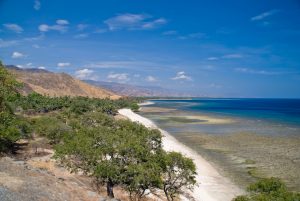Last week, Timor-Leste’s premier withdrew his resignation, citing the need for continuity in the country’s political leadership to see out the battle against the global coronavirus pandemic. The development spotlighted the issue of how COVID-19 might impact the Southeast Asian country’s politics.
As I have observed previously, while Timor-Leste has made progress toward statebuilding in some areas since its full independence back in 2002 after a painful struggle against colonialism, it still faces significant political and economic challenges as one of the world’s poorest economies and a polity that that has seen eight governments come and go in less than two decades. Those challenges remain into 2020 as well. Timorese politics have been shrouded in uncertainty since January, following the collapse of the governing coalition after the failure to pass a budget amid coalition infighting that saw Prime Minister Taur Matan Ruak resign.
While indications had surfaced that a six-party coalition in Timor-Leste led by independence leader and former prime minister Xanana Gusmao has the necessary support to form a new government, with rising anxiety about COVID-19, the country’s future political and economic outlook remains uncertain. Though the virus has yet to impact Timor-Leste significantly, there are anxieties about rising cases and how Dili’s heavily hydrocarbon-dependent economy will be affected by COVID-19, with a series of measures being taken including a state of emergency, a $250 million fund to combat the virus, and selective quarantine and surveillance.
Last week, we saw a more direct indication of how COVID-19 is affecting Timor-Leste when its premier withdrew his resignation. Ruak, who had earlier resigned, said he had now agreed to stay on until a new government is formed.
“I withdraw the submission of my resignation … because I think that in a situation like this the country needs all of us, especially me as a prime minister,” he told reporters after meeting President Francisco Guterres. Subsequently, via video livestreamed on Facebook, Guterres said he accepted the request in view of the “difficult situation we are facing right now.”
As of now, how exactly this will affect the country’s politics remains to be seen. As noted earlier, the virus has yet to impact Timor-Leste significantly, making it difficult to forecast how long Ruak’s revoked resignation will last and how it could impact the wider political situation. Gusmao has also been giving his own comments on the virus along the way. More broadly, coalition dynamics are also fragile and unclear. While Gusmao’s six-party coalition is ready to form a government, there have been reported efforts by other parities to reconstitute a minority government as well, and options to resolve the current political impasse have been restricted by the ongoing COVID-19 situation.
Nonetheless, given the country’s political instability in recent years as well as the fragility of current coalition dynamics, Ruak’s revoked resignation, the trajectory of COVID-19 in Timor-Leste, and the wider political and economic implications will continue to be important to watch.

































